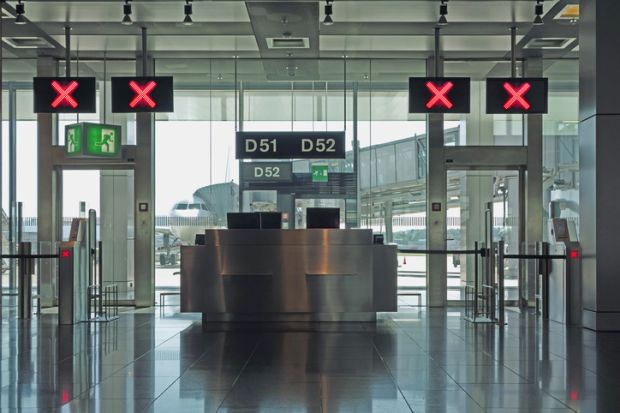There are some parts of academic culture that, with the distance and perspective brought about by the pandemic, now feel environmentally toxic. Expectation and entitlement around flying is certainly one of them.
I have always felt very privileged to be able to fly around the world attending conferences, seminars and meetings, participating in visiting fellowships and building international networks. Those networks have served me well but as the extent and urgency of the climate crisis has become progressively clearer, it’s felt much harder to justify what a (hastily deleted) government report recently called an “immoral indulgence”.
Throw in the pandemic and successive lockdowns, which have broken the routine of flying and shown us alternative ways to engage, and I’ve reached the point where the idea of flying represents cognitive dissonance. I can’t square it with myself (and my family) any longer, even though it remains affordable and invitations to international conferences are ramping up again. If our purpose is to advance knowledge, how can we justify selectively ignoring the undeniable fact that air travel is bad news for the climate?
THE Campus spotlight: Universities’ role in the climate change battle
I’ve signed the No Fly Climate Sci pledge and have vowed to travel less overall. This doesn’t mean engaging less, and the past 18 months have clearly demonstrated that I am no less capable of forging and maintaining fruitful networks if I don’t fly. In this period, I have made some of the most significant connections of my career from the comfort of my spare room and have submitted more collaborative international funding proposals than ever before.
There are currently no requirements for us to justify our decisions to fly, aside from cost and value for money, and we are not asked to weigh up the carbon implications of our travel choices. We can’t rely on research funders to keep us in check either, as they rarely assert expectations in terms of environmental standards, even when funding environmental research. And whatever is agreed at COP26, it is unlikely to be enough to avert significant environmental destruction even if it is implemented in full.
In light of this, commitments to fly less need to come from within institutions and from us as individuals. We must square our international mobility with our own consciences – a particular challenge for anyone carrying the heavy emotional burden of a career in environmental research. While lab emissions are significant for many universities with equipment demanding large amounts of electricity, much of the environmental research points to flying as the area of greatest impact and carbon reduction potential.
A paper published in 2016 highlighted how one large conference generates about 22,000 metric tons of carbon dioxide, equivalent to the annual carbon emissions associated with 1,000 medium-sized labs, and how one transatlantic flight is responsible for the same level of emissions as one year of commuting 25km each day in a car. Hence, larger universities will contribute about 10,000 tonnes of carbon dioxide each year from air travel, while emissions from other forms of travel are likely to total only about 400 tonnes.
Some academics appear to experience a curious sense of exceptionalism around flying. Despite being educated, informed and rigorous, they can make reckless choices to fulfil largely unquestioned cultural expectations about how to collaborate and exchange knowledge. However, we are not exceptional cases.
So, what might we do differently? I would urge us all to take advantage of this moment of change to put an end to business travel by air. Sign the No Fly Climate Sci pledge and have fun finding creative new ways of doing things. For example, investigate travel by train: it may take longer but the travelling time is more likely to be productive. Read some of the great resources from the Sustainability Exchange’s Travel Better package, including decision trees to help you reach sound decisions on your travel choices and FAQs that address common concerns about reducing air travel (including common rebuttals to the “that plane will be flying even if I’m not on it” argument). You can also set up a “travel better” pledge for your department.
Also, think twice before inviting people to come from the other side of the world to give seminars in your department. And identify examiners who can travel sustainably to the examination or ask the students to take it online.
In addition, resist mega-conferences. They’re largely money spinners and too big for meaningful networking. Focus instead on smaller events and support conferences organised with regard for the environment; over time, they will grow in significance.
If organising a conference, consider setting it up as a series of branch meetings, where groups of delegates meet in hubs in their own or neighbouring countries and engage with other branches online, coming together for plenaries. Choose locations that can be reached via low carbon options for most people, not just based on where is a nice place to visit or whose turn it is to host.
And work on your own FoMo (Fear of Missing Out) from not attending everything. Work instead towards sensitising others to the need for the research community to lead by example on climate change. Missing out is by far the lesser of the evils we are confronted with.
Aimee Ambrose is professor of energy policy at Sheffield Hallam University.
Register to continue
Why register?
- Registration is free and only takes a moment
- Once registered, you can read 3 articles a month
- Sign up for our newsletter
Subscribe
Or subscribe for unlimited access to:
- Unlimited access to news, views, insights & reviews
- Digital editions
- Digital access to THE’s university and college rankings analysis
Already registered or a current subscriber? Login








